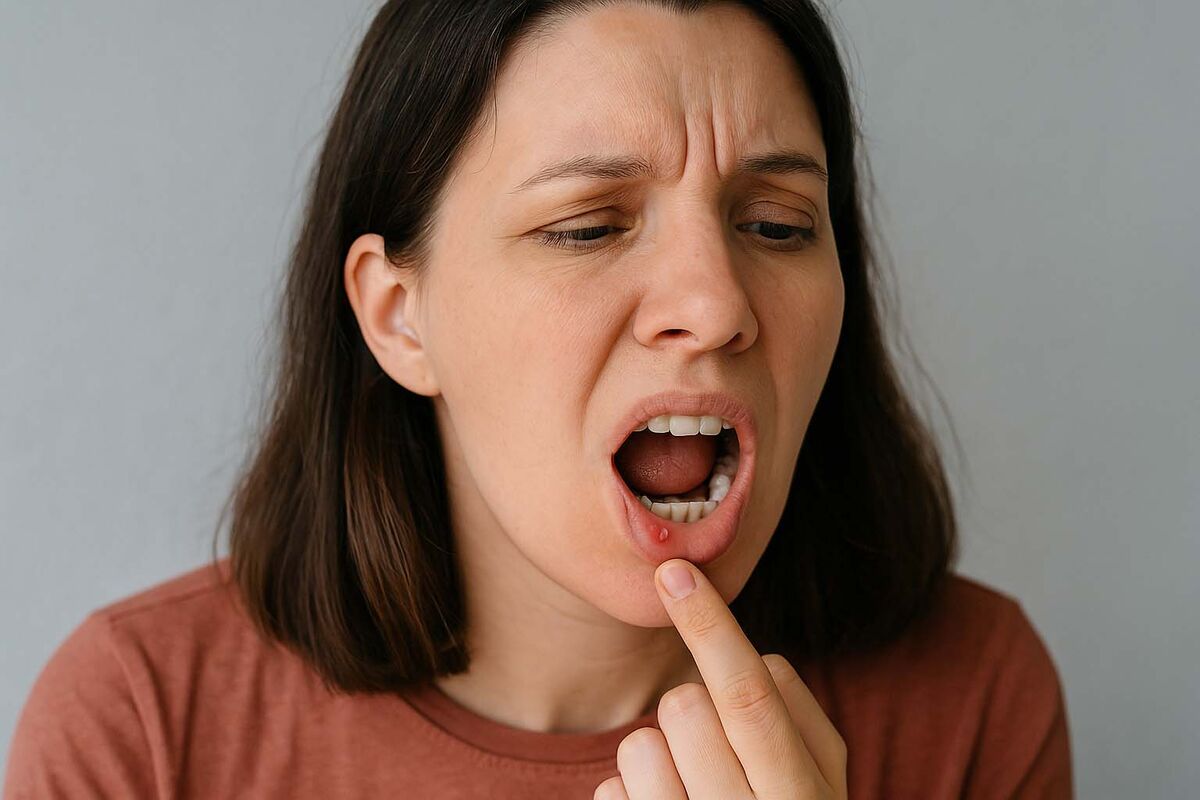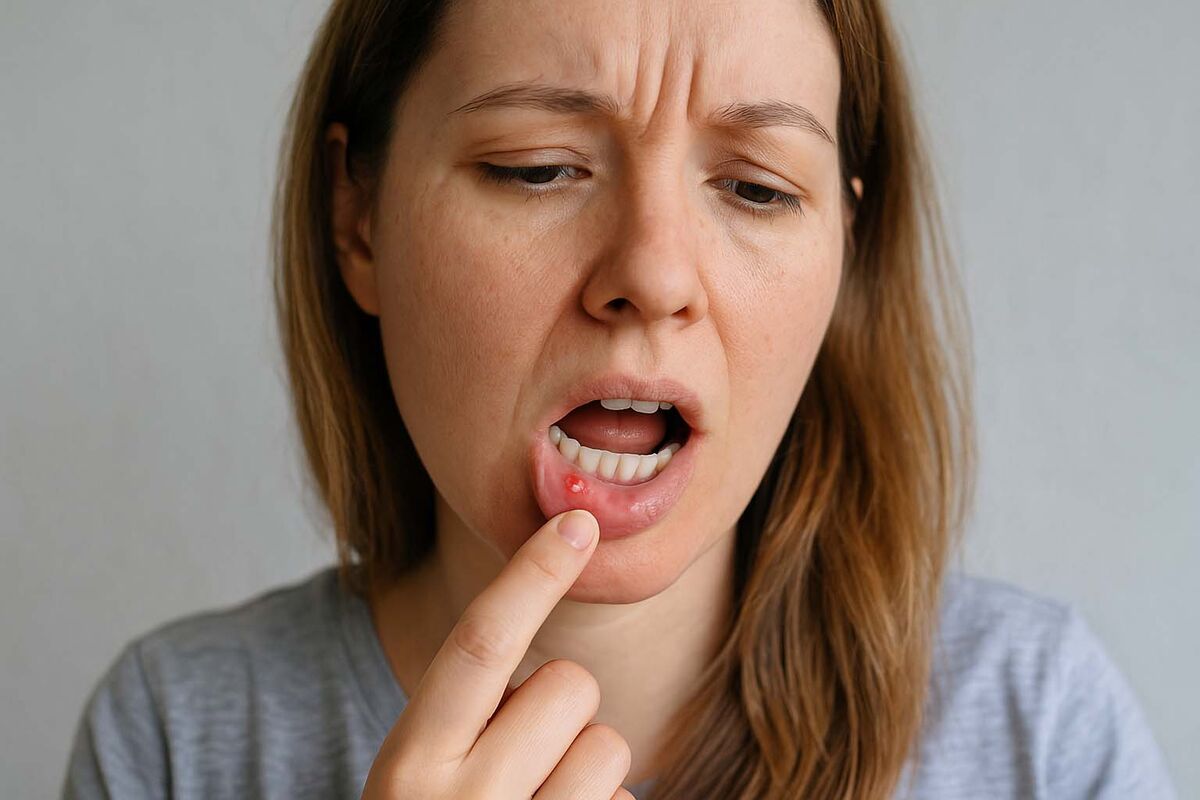Mouth Ulcers: Introduction
Mouth Ulcers: That small, painful sore in your mouth can be a huge source of frustration, turning a simple meal or a conversation into a painful ordeal.
While these common irritations are typically harmless and heal on their own, understanding what causes them and how to manage them can make a world of difference.
This comprehensive guide will walk you through everything you need to know about mouth ulcers, from identifying the most common symptoms to exploring their potential causes and the most effective treatments.
We’ll also cover natural remedies, prevention strategies, and how they relate to your overall health. By the end of this post, you’ll be well-equipped to manage these annoying sores and take proactive steps toward better oral well-being.
Mouth Ulcers: What Are the Common Symptoms?
Mouth Ulcers: They often begin with a subtle tingling or burning sensation before a visible sore appears. The most prominent symptom is pain, which can range from a dull ache to a sharp, stinging pain, particularly when eating, drinking, or talking.
These sores are typically round or oval with a white, gray, or yellow center and a distinct red, inflamed border. They can form on the inside of your cheeks, lips, on or under the tongue, and at the base of your gums.
The size of the ulcer can vary significantly, from a small dot to a much larger lesion. You might also experience a general feeling of discomfort in your mouth, and in some more severe cases, swollen lymph nodes in your neck.
While most mouth ulcers are a minor irritation that heals on its own, a sore that is unusually large, persistent, or recurring could be a sign of an underlying health condition that needs professional attention.
Being able to recognize these symptoms is the first step toward effective management and maintaining good oral health.
Mouth Ulcers: What Are the Primary Causes?
Mouth Ulcers: The exact cause isn’t always clear, but several factors are commonly linked to their development. A frequent trigger is minor physical injury, such as accidentally biting your cheek, using a hard-bristled toothbrush, or irritation from dental braces or dentures.
Nutritional deficiencies are another significant cause; a lack of essential vitamins and minerals, especially vitamin B12, iron, and zinc, can make you more susceptible to developing sores.
Stress and hormonal changes are also known culprits, which is why some people find they get ulcers during periods of high anxiety or their menstrual cycle. Certain foods, such as spicy, acidic, or salty items, can irritate the delicate lining of the mouth and trigger an ulcer.
Additionally, some people are genetically predisposed to getting these sores. Keeping a food and stress diary can help you identify your specific triggers and take proactive steps to better manage your oral health.

Mouth Ulcers: How Are They Diagnosed?
Mouth Ulcers: Diagnosing them is generally a straightforward process that a dentist or doctor can do with a simple visual examination. The appearance of the sore, combined with the patient’s description of symptoms, is usually enough for a confident diagnosis.
The medical professional will carefully examine the size, shape, color, and location of the lesion to distinguish it from other oral conditions.
During the examination, they may ask questions about your medical history, diet, and lifestyle to identify potential triggers. In some rare instances, if an ulcer is unusually large, persistent, or doesn’t respond to typical treatments, further investigation may be necessary.
This could involve a biopsy, where a small tissue sample is taken and sent to a lab for analysis, or blood tests to check for underlying health issues.
While most sores are benign and heal on their own, a professional opinion can provide peace of mind and help rule out more serious conditions, ensuring your overall health is not at risk.
Mouth Ulcers: What Are the Most Effective Treatments?
Mouth Ulcers: Treatment for them often focuses on two key goals: pain relief and speeding up the healing process. For most minor cases, a simple saltwater rinse can help reduce inflammation and keep the area clean.
Over-the-counter topical gels or pastes containing ingredients like benzocaine or hydrogen peroxide can numb the area and provide temporary relief from pain.
If you are dealing with a larger or more painful ulcer, a dentist might prescribe a stronger medicated mouthwash or a steroid ointment to reduce inflammation.
Avoiding spicy, acidic, and crunchy foods during the healing period can also prevent further irritation and discomfort. Ensuring you maintain a balanced and nutritious diet, rich in vitamins and minerals, can support your body’s natural healing abilities and contribute to better overall health.
These simple yet effective strategies can make a significant difference in managing your symptoms and helping you recover quickly.
Mouth Ulcers: Can They Be a Sign of a More Serious Condition?
Mouth Ulcers: While they are typically benign and a common annoyance, in rare cases, they can be an indicator of a more significant underlying health issue.
For example, recurrent or multiple ulcers might be a symptom of a systemic disease like Celiac disease or an inflammatory bowel condition such as Crohn’s disease.
Persistent sores that do not heal within two to three weeks could also be an early sign of oral cancer, especially if they are irregular in shape or firm to the touch. Autoimmune disorders, such as Behcet’s disease, can also cause recurring oral and genital sores.
It’s crucial to pay attention to your body and not dismiss any persistent or unusual symptoms. If you have sores that are unusually large, don’t heal, or are accompanied by other symptoms like a fever or rashes, it’s essential to seek professional medical advice to ensure your overall health is not at risk and to get the right diagnosis.

Mouth Ulcers: How Can You Prevent Them?
Mouth Ulcers: Preventing them often involves making simple adjustments to your daily habits and diet. One of the most effective strategies is to avoid minor injuries to your mouth.
This includes using a soft-bristled toothbrush, being careful when chewing, and ensuring any dental appliances or braces fit correctly and don’t cause friction.
Pay close attention to your diet and identify any foods that seem to trigger the sores; acidic fruits, spicy foods, and nuts are common culprits. Managing stress is another key preventative measure, as high anxiety is a known trigger.
Techniques like meditation, yoga, or deep breathing exercises can help lower your stress levels. Additionally, ensuring you have a balanced and nutritious diet, rich in vitamins like B12, iron, and folate, is essential for overall health and can help your body fight off the conditions that cause these irritating sores.
Regular dental check-ups can also help identify and address potential issues early on, promoting better oral health.
Mouth Ulcers: Do Certain Foods Make Them Worse?
Mouth Ulcers: Yes, certain foods can definitely aggravate them and make the healing process longer and more painful. Spicy, acidic, and salty foods are the primary culprits. Think about things like chili peppers, citrus fruits (oranges, lemons), and highly salted snacks like chips.
These foods can irritate the sensitive tissue around the sore, causing more inflammation and a sharp, stinging pain. Crunchy or hard foods, such as crackers or crusty bread, can also cause further injury to the ulcerated area, potentially delaying healing.
Additionally, very hot beverages can also be a source of irritation. During a flare-up of mouth ulcers, it’s best to stick to soft, bland foods that are gentle on your mouth.
Opt for things like yogurt, mashed potatoes, soups, and smoothies. Being mindful of your diet is a simple yet effective way to manage your symptoms and promote better oral health.
Mouth Ulcers: What Are the Best Ways to Manage the Pain?
Mouth Ulcers: Dealing with the constant pain and discomfort of a sore can be frustrating, but several effective strategies can provide immediate relief. One option is using over-the-counter topical anesthetics that come in gel or liquid form.
These products contain ingredients like benzocaine or lidocaine that temporarily numb the area, making it easier to eat and drink. Another excellent solution is an oral patch, which adheres directly to the sore and creates a protective barrier against irritation from food, teeth, or braces.
For temporary relief, a cold compress or an ice cube held gently against the sore can help reduce swelling and numb the area. When eating, try to use a straw for liquids and opt for soft, non-acidic foods to avoid further irritation.
Managing the pain is a crucial part of the healing process and contributes significantly to your overall health. By having these tools in your toolkit, you can make the experience of having mouth ulcers much more manageable and less disruptive to your daily life.

Mouth Ulcers: How Does Your Diet Impact Them?
Mouth Ulcers: The food you eat plays a significant role in both the occurrence and prevention of these bothersome sores. One of the most common contributing factors is a deficiency in key vitamins and minerals, specifically B vitamins (B12 and folate), iron, and zinc.
These nutrients are vital for maintaining healthy cell growth and function throughout your body, including the delicate tissues in your mouth. A lack of these can weaken your oral mucosa, making you more susceptible to developing sores.
To combat this, focus on incorporating nutrient-dense foods into your diet, such as leafy greens, lean proteins, nuts, and fortified cereals. By ensuring your body has the right building blocks, you can strengthen your resistance to irritations and support your overall health.
Addressing nutritional gaps is a proactive step toward managing recurring mouth ulcers and is a foundational aspect of maintaining good oral health.
Mouth Ulcers: Are They Contagious?
Mouth Ulcers: No, they are not contagious. Unlike cold sores, which are caused by the herpes simplex virus and are highly contagious, mouth ulcers are not viral or bacterial infections. They are typically a result of a physical injury, a nutritional deficiency, stress, or other internal factors.
You cannot spread them to another person through kissing, sharing food, or using the same utensils. This is an important distinction to make and can help to reduce any unnecessary worry or stigma.
While they are a nuisance and can be quite painful for the person who has them, you don’t need to worry about transmitting the condition to others. Understanding this fact can help you feel more at ease about the condition and focus on your own health and recovery without concern for others.
Mouth Ulcers: What’s the Difference Between Them and Cold Sores?
Mouth Ulcers: A common point of confusion is mistaking mouth ulcers for cold sores, but they are fundamentally different conditions. The key distinction lies in their cause and location. Canker sores (the term for mouth ulcers) are not caused by a virus and are therefore not contagious.
They are an internal issue, typically appearing on the soft tissues inside the mouth, such as the cheeks, lips, and tongue. Their appearance is also distinct: they are usually round or oval with a white or yellow center and a red border.
They are generally a one-off occurrence triggered by minor trauma, stress, or nutritional deficiencies. In contrast, cold sores are caused by the herpes simplex virus (HSV-1), making them highly contagious and prone to recurring.
They usually appear on the outside of the mouth, on or around the lips, and often manifest as a cluster of small blisters that eventually crust over.
Understanding this difference is crucial for proper treatment and managing your oral health, as the approaches for a viral infection versus a non-viral sore are completely different. Knowing the cause and nature of the sore is the first step toward effective and safe health care.
Are There Any Effective Natural Remedies?
Mouth Ulcers: For those seeking gentler alternatives, several natural remedies can help soothe the pain and promote healing. One of the most common and effective is a simple saltwater rinse.
The antiseptic properties of salt help to clean the sore and reduce inflammation, which can provide significant pain relief. Another popular remedy is honey, known for its antibacterial and anti-inflammatory qualities.
Applying a small amount of pure, unprocessed honey directly to the mouth ulcers can form a protective layer, prevent infection, and speed up the recovery process. Coconut oil is also frequently recommended; its antimicrobial properties can help protect the sore from bacteria.
Chamomile, often used as a tea, contains compounds that may help reduce inflammation and soothe irritation when used as a mouthwash.
While these remedies can be helpful for symptom management and supporting your oral health, they are not a substitute for professional medical advice, especially for persistent or severe sores. Always consult a healthcare professional to ensure the best outcome for your overall health.
When Should You See a Doctor or Dentist?
Mouth Ulcers: While they usually heal on their own, there are specific situations where you should seek professional medical advice. If an ulcer persists for more than two to three weeks without any signs of healing, it’s a good idea to get it checked out.
Also, if the sore is unusually large, painful, or keeps recurring, a professional can help determine the underlying cause and recommend a more targeted treatment.
You should also see a doctor if your ulcers are accompanied by other symptoms like a high fever, a rash on your skin, or difficulty swallowing.
These could be indicators of a more serious health problem. If you have a compromised immune system or are undergoing medical treatment that might affect your oral health, it’s always wise to consult with a healthcare professional. Taking these steps ensures you’re proactive about your health and get the right diagnosis and care.
How Do They Affect Your Overall Health?
Mouth Ulcers: While often a localized issue, a chronic problem with them can have a noticeable impact on your overall health. Persistent or painful ulcers can make it difficult to eat, leading to poor nutrition and even weight loss over time.
The constant discomfort can also affect your mood and quality of life, leading to stress and anxiety. Furthermore, recurring mouth ulcers can be a sign that your body is deficient in essential nutrients like vitamin B12 or iron, highlighting a need for dietary changes or supplements.
In some cases, as mentioned earlier, they can be a symptom of a larger systemic illness, such as an autoimmune disease. Paying attention to your body’s signals is key.
By addressing the root cause of your ulcers, whether it’s stress, diet, or an underlying medical condition, you’re taking a step toward better long-term health.
Conclusion
In conclusion, while mouth ulcers are a common and often minor annoyance, being informed about them is the first step toward effective management.
We’ve explored how these painful sores are typically caused by minor injuries or lifestyle factors like stress and diet, and we’ve discussed a range of treatments from simple saltwater rinses to professional medical care.
We also learned that paying close attention to your body and recognizing when a sore is more than a minor irritation can be crucial for your overall health.
By adopting proactive habits like maintaining a balanced diet, managing stress, and practicing good oral hygiene, you can significantly reduce the frequency of these sores.
Remember, while most mouth ulcers heal on their own, don’t hesitate to consult a healthcare professional if a sore is persistent, unusually painful, or accompanied by other concerning symptoms. Being proactive about your oral well-being is a key component of a healthy life.
FAQ
Mouth ulcers are small, painful sores that appear inside the mouth. They are typically white, grey, or yellow with a red, inflamed border and can form on the cheeks, lips, tongue, or gums.
No, mouth ulcers are not contagious. Unlike cold sores, which are caused by a virus, mouth ulcers are not a viral infection and cannot be passed from person to person through kissing or sharing food.
The most common causes of mouth ulcers include minor injuries to the mouth (from biting or brushing too hard), nutritional deficiencies (like a lack of B12 or iron), high levels of stress, and certain acidic or spicy foods.
Most mouth ulcers are minor and will heal on their own within one to two weeks. However, if a sore is unusually large or persists for more than three weeks, it’s best to consult a healthcare professional.
Yes, stress is a known trigger for mouth ulcers. High levels of anxiety and emotional stress can affect your immune system and make you more susceptible to developing these sores.
Yes, simple home remedies can help. A saltwater rinse can reduce inflammation and keep the area clean. You can also apply a small amount of honey or a topical gel to the mouth ulcers for temporary relief.
If you have mouth ulcers, it’s best to avoid spicy, acidic, and salty foods, as they can irritate the sore and cause more pain. Crunchy or hard foods can also cause further injury, so opt for soft, bland foods during the healing period.
You should see a doctor or dentist if your mouth ulcers are unusually large, don’t heal within three weeks, keep recurring, or are accompanied by other symptoms like a fever or rash.
Yes, a lack of certain nutrients can be a direct cause. Deficiencies in vitamins like B12, folate, iron, and zinc can weaken the oral tissues and make you more prone to developing mouth ulcers.
The main difference is their cause and location. Mouth ulcers appear inside the mouth and are not contagious, while cold sores are a viral infection that typically appears on or around the lips and are highly contagious.




















Leave a Reply